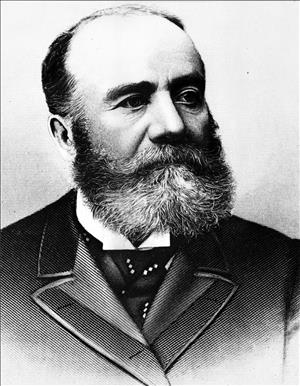On July 14, 1884, voters elect businessman John Leary (1837-1905) as mayor of the City of Seattle. Leary, whose wide-ranging investments include real estate, railroads, banking, and publishing, runs for office on the Business Men's ticket.
Leary was born in the province of New Brunswick, Canada, on November 1, 1837. As a young man, he developed an “unusual aptitude for business and a genius for the successful creation and management of large enterprises” (Bagley, Vol. 2, p. 724). By age 17, he was buying and selling timber in Canada. When changing trade agreements between Canada and the United States made that business less profitable, he emigrated to the U.S. He lived briefly in Maine and then settled in Seattle, in 1869.
At the time, Seattle was a frontier village with a population of about 1,000. Leary quickly moved into a position of prominence. He was admitted to the Washington state bar in 1871. Although he maintained a law practice for 10 years, he increasingly devoted his time to business activities. One of his first ventures was the Talbot coal mine near Renton, which he developed in partnership with John Collins in 1872 (Collins was elected mayor of Seattle the following year).
Leary was involved with virtually every major civic and commercial undertaking in Seattle in the 1870s and 1880s. Among them was the Spring Hill Water Company, a privately owned water system established in 1881. The company operated Seattle’s first integrated distribution system, supplying water -- initially from springs on First Hill, later from Lake Washington -- to homes and businesses throughout the city. The system’s inadequacies were revealed by the Great Fire of June 1889, which destroyed much of downtown Seattle. The City of Seattle began developing its own system, using water from the Cedar River. In January 1890, Leary and his partners sold Spring Hill to the city for $352,000.
Among Leary’s other interests were banking and journalism. He was a founder and director of the First National Bank of Seattle, established in 1882. At around the same time, he became the principal owner of the Seattle Post, which he merged with the separately-owned Intelligencer, creating the Seattle Post-Intelligencer. He sold his interest in the consolidated paper in 1884 and turned his attention to railroads.
Frustrated by the Northern Pacific Railroad Company’s failure to extend its tracks to Seattle, Leary and a dozen other local notables (led by attorney Thomas Burke) incorporated the Seattle, Lake Shore & Eastern Railroad Company. Leary’s experiences in the timber industry and in coal mining had taught him the importance of railroad lines that could transport heavy loads around the region and to and from distant markets. A railroad that would skirt the northern shore of Lake Washington to Sumas, Washington, on the Canadian border, could connect with the Canadian Pacific Railway, “enabling Seattle to snap its fingers at the Northern Pacific” (Bagley, Vol. 1, 248).
The Seattle, Lake Shore & Eastern Railroad soon built a depot in downtown Seattle, near the corner of Columbia Street and Western Avenue. In the late 1880s, ongoing construction costs led the railroad’s initial investors to organize the Seattle & Eastern Construction Company. This company raised money to finance an extension of the line toward Spokane in eastern Washington. In 1892, Northern Pacific Railroad absorbed the line, in an effort to forestall competition from Great Northern and Union Pacific railroads.
Leary also invested heavily in other public utilities, including gas lighting and electric streetcars, and in real estate. He was a founder of the Seattle Steam Navigation & Transportation Company and the Columbia River & Puget Sound Navigation Company, which operated steamships and other vessels between ports in Washington, Oregon, and British Columbia. At various times, he served as president of the Seattle Land & Improvement Company, the West Coast Improvement Company, and the Seattle Warehouse and Elevator Company. He was a charter member of the Rainier Club, an exclusive men’s club, organized in Seattle in October 1888, and he was also active in the Masonic Lodge.
Leary served three terms as a member of the Seattle city council (in 1873, 1875, and 1876). When he was elected mayor in 1884, he departed from tradition and kept regular office hours, even though the position was unsalaried. Among his accomplishments as mayor was the planking of 1st Avenue, which until then was basically a “mud hole” (Bagley, Vol. 2, 725). He was also the only mayor in Seattle’s history to be elected as a candidate of the Business Men’s party.
Leary ran again for mayor in 1892, but he was defeated by Democrat James T. Ronald, a lawyer and later a district judge. Later that year, Leary married Eliza P. Ferry, a daughter of Elisha P. Ferry, the first governor of the State of Washington.
When he died, on February 9, 1905, Leary left an estate valued at about $2 million.

